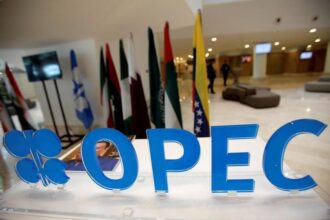Investing.com– Oil prices fell slightly in Asian trade on Thursday as a swathe of weak PMI readings spurred concerns over slowing economic growth, while an uptick in U.S. production and exports showed supply may not be as tight as initially expected.
The Energy Information Administration (EIA) estimated that U.S. crude output came close to pre-COVID highs last week, while exports rose.
Data on Wednesday also showed an unexpected, substantial build in U.S. and inventories over the past week, which pointed to weakening U.S. fuel demand and largely overshadowed a bigger-than-expected draw in broader .
This put oil prices close to their weakest level in nearly a month, and also set them on course for a fourth straight day of losses. fell 0.3% to $83.0 a barrel, while fell 0.3% to $78.64 a barrel by 20:33 ET (00:33 GMT).
Oil prices took little relief from a dip in the , with markets on edge ahead of more signals on U.S. monetary policy from the on Friday.
U.S. production, exports up; Iraq supply also in focus
EIA data estimated that (mb) in the week to August 18, coming close to the record 13.1 mb seen in early-2020, before the COVID outbreak.
Over 10 mb from last week’s output was also directed towards exports, with analysts noting that U.S. producers were moving to plug a gap in Saudi and Russian supply. The two countries had announced bumper supply cuts earlier this year, which was expected to tighten crude markets in the latter half of 2023.
In addition to increased U.S. supplies, recent media reports also showed that Turkish and Iraqi energy ministers were negotiating the resumption of oil exports from the Kurdish region, which could release 450,000 barrels per day of oil. But Reuters reported that no agreement had been reached as of Wednesday.
Saudi Arabia and Russia are also expected to continue with their production cuts, with analysts now expecting Riyadh to extend its 1mb per day cut until end-October. Supply cuts by the two oil giants had greatly boosted oil prices over the past two weeks.
China concerns, weak U.S. fuel demand also weigh
Fears of slowing Chinese crude demand persisted as the world’s largest oil importer struggles with a slowing post-COVID economic recovery.
The Chinese government has largely dragged its feet in rolling out more stimulus measures, sparking some impatience among investors. The People’s Bank cut interest rates by a smaller-than-expected margin this week.
U.S. fuel demand also appeared to be winding down in tandem with the summer season, as gasoline and distillate inventories logged strong builds over the past week.
Weak purchasing managers’ index (PMI) readings from the and added to concerns that slowing economic growth will dent demand.
Read the full article here










